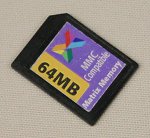 Digital Film? Single-Use Chip Memory Coming
Digital Film? Single-Use Chip Memory Coming
By
Dave Etchells, The Imaging Resource
(Sunday, February 24, 2002 - 02:46 EST)
Matrix semiconductor develops write-once semiconductor memory for use as "digital film" in digicams.
This is an interesting item that I'm not quite sure how to evaluate. (Smash hit or dud?) An outfit called Matrix Semiconductor has developed a unique semiconductor technology that stacks memory cells on top of each other to produce ultra-dense, ultra-cheap digital memory. (Roughly 8x the bit density of conventional flash memory.) There's only one catch (or is it a feature?): You can only write to it once, and once written, the data is stored permanently. Basically, what it amounts to is a flash memory card (CompactFlash, Secure Digital, etc) that will sell for a lot less than conventional, rewritable chips, and that would constitute "archival" storage once written to.
As I said, I'm really not sure what to think of the concept. At first glance, it flies in the face of one of the principal attractions of digital photography -- the lack of "film" costs. On the other hand though, there are plenty of times when you'd like to have a lot of very cheap memory, that you also might not care whether was rewriteable or not. (Think in terms of a long vacation, where you may not have any way to offload memory cards to a computer until you get back.)
Of course, this is exactly the application space that Sony is aiming at with their CD-R(W) cameras, as seen in their just-announced MVC-CD250 and MVC-CD400 cameras. - And generic 80mm CD-R media sells for well under a dollar for a 156 MB disc. A tough price point to match for any sort of semiconductor-based technology... What the Matrix Semiconductor technology offers though, is low cost archival storage for "conventional" digicams built around flash memory cards rather than optical media.
I guess where I come out on the concept will have a lot to do with the price it ends up selling for. At the show, Matrix reps talked about 64 MB memory cards that would sell for "the same price as a three-pack of 36-exposure film." - Or about $15 per card at "high retail". Perhaps $10 per card at low retail. Hmm... Occasional IR advertiser Newegg (http://www.newegg.com/) is currently selling conventional flash memory cards for only $21 per 64 megabytes. It seems like Matrix and their partners need to be aiming at a much lower price point for this to make sense. How low? I haven't a clue, but I'd guess that $5 per 64 megabytes would be an absolute upper limit. At that rate, 256MB of memory cards would run $20. With a current 3-4 megapixel digicam having a file size of roughly 2 MB, that's about 120 images, making a cost of about $0.17 per shot. - I don't know about you but I might go for that, but not much more. Matrix' price point of $15 for a 64 MB card is closer to $0.50 per shot, a number that strikes me as clearly too high.
I guess time will tell on this one, and perhaps the target prices will change as we get closer to the product actually being available. Matrix says their first partner (Matrix themselves will not sell memory cards directly, but rather license the technology to existing semiconductor makers, the first of which appears to be Thompson Semiconductor) should have SD cards based on the technology shipping by the fourth quarter of this year.
|